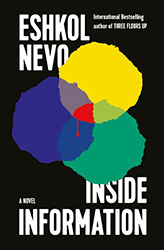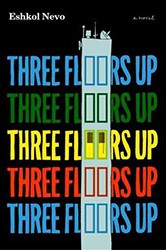Eshkol Nevo’s previous novels, all bestsellers in his native Israel, affectionately and acerbically capture the universal intricacies of family life. Though never drifting too far from this enduring theme, The Last Interview is at once both Nevo’s most artistically audacious and perhaps his most personal book to date. A genre-busting narrative in the best sense, the novel is structured as a wide-ranging interview that initially reads as a parody of the entire convention of boilerplate author Q&As but rapidly evolves into a disquieting examination of the protagonist’s soul as one disturbing revelation leads to the next. The result is intellectually exhilarating and often terrifically moving.
Nevo seems to have had a great deal of fun with this conceit, playing with the performative nature of the protagonist’s public persona and the readers’ assumptions about his private and professional lives. Along the way, we encounter unsparing portraits of an atrophying marriage and other relationships, as well as amusing and sometimes harrowing portrayals of the protagonist’s appearances at Israeli and international book events. Throughout this mosaic of colorful and sometimes jaw-dropping vignettes, one often wonders just where the line between fiction and reality is crossed. Besides offering provocative allusions to Nevo’s own life circumstances and family lineage (his grandfather was Israel’s third prime minister and he also illuminates the historical accomplishments of the unjustly marginalized women in his family), The Last Interview provides sobering reflections on an Israel that, over time, has grown more repressive and impatient with critical interrogations of its policies by artists. On the other hand, when asked how he can endure life in Israel, the protagonist retorts: “How can you live and write in a place that summons up no memories? That you don’t care about? That doesn’t infuriate you so much sometimes that you want to bang your head against the wall and your fingers on the keyboard?”
Though long appreciated for his empathic and complex portrayals of the lives of women (the protagonist in this novel claims that his female characters are closest to his own psyche), especially their richly imagined inner worlds, Nevo’s most abiding concern in many works seems to be the sustaining nature of male friendships. In The Last Interview, the protagonist’s relationship with a childhood friend dying of cancer is particularly moving and ultimately provides the most satisfying thread in this tapestry of interconnected thoughts. Throughout, there is a pervasive sense of a writer at the height of his powers taking stock of both himself and his country’s soul.
The idea for this unconventional approach to crafting a novel reportedly came to Nevo during a frustrating hiatus. Struggling to overcome writer’s block, he came up with a game in which he formulated startlingly uninhibited responses to many of the ordinary queries he’d received over the years, an experiment for which we should feel grateful. (For the record, Nevo himself has proved a generous and engaging interviewee throughout his career.) Those encountering Nevo’s work for the first time will surely find The Last Interview an irresistible introduction to his earlier writing, while those familiar with his oeuvre will find it a profoundly fulfilling examination of the themes that run through Nevo’s life and art.
Ranen Omer-Sherman is the JHFE Endowed Chair in Judaic Studies at the University of Louisville, author of several books and editor of Amos Oz: The Legacy of a Writer in Israel and Beyond.





